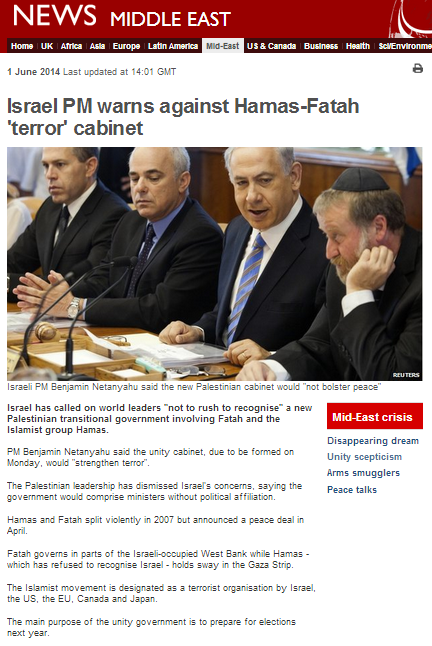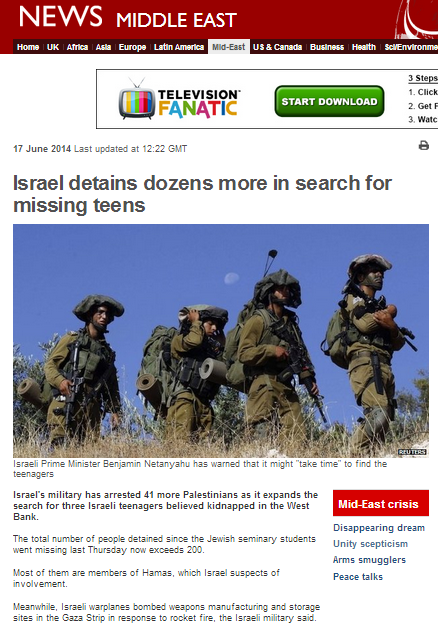The BBC News website’s reporting ahead of the formation of the new Palestinian unity government on June 2nd has highlighted an interesting case of incompatibility between politically motivated BBC approved terminology and reality.
On May 29th an article appeared on the BBC News website’s Middle East page under the title “Abbas asks PM Rami Hamdallah to head Fatah-Hamas unity cabinet“. There, BBC audiences were informed that:
“Fatah governs in parts of the Israeli-occupied West Bank while Hamas – which has refused to recognise Israel – holds sway in the Gaza Strip.”
That statement was repeated an additional article titled “Israel PM warns against Hamas-Fatah ‘terror’ cabinet” which also appeared on the BBC News website’s Middle East page on June 1st.
Whilst Fatah is indeed the dominant party in the Palestinian National Authority and the PA’s current president (albeit lacking an elected mandate since 2009) belongs to that party, it is the latter which was established under the terms of the Oslo Accords as an interim self-government body rather than Fatah and hence the BBC’s statement is inaccurate.
The Palestinian National Authority does indeed govern Areas A and B (with the mutually agreed exception of security control in the latter) in accordance with the terms of the Oslo Accords, running its own government, judiciary and security forces. It runs its own finances, makes its own laws and collects taxes. It issues passports, conducts foreign relations and provides services such as healthcare and education to the people living under its jurisdiction.
And yet despite the fact that – pursuant to the terms of agreements signed between Israel and the PLO – the PA governs the areas in which the vast majority of Palestinians live, the BBC still describes the entire region as “the Israeli-occupied West Bank” whilst at the same time acknowledging the reality of PA governance.
Clearly, such ‘have your cake and eat it’ terminology is misleading and confusing to BBC audiences. Article 42 of the 1907 Hague Regulations states that:
“Territory is considered occupied when it is actually placed under the authority of the hostile army. The occupation extends only to the territory where such authority has been established and can be exercised.”
But in Areas A and B, the PA’s authority has – by mutual agreement between Israel and the PLO – been established and is exercised in place of that of the Israeli army and in Area C the current situation of Israeli civil administration is also the fruit of those mutual agreements, with some commentators holding the view that this fact negates the use of the term ‘occupation’.
Obviously the BBC cannot ignore the fact that the Palestinian National Authority has been in existence for twenty years and that the vast majority of Palestinians outside the Gaza Strip live under its governance. Nevertheless, it continues the bizarre practice of describing regions it rightly describes as governed by the PA as being simultaneously “Israeli-occupied”.
The political motivations behind that practice are all too apparent, but no less grave than the clear breach of impartiality it demonstrates, this incongruous policy is particularly pernicious because its use of dumbed-down political sloganeering actually prevents BBC audiences from understanding the realities of the situation on the ground in contradiction of the corporation’s public purposes remit which obliges it to “build a global understanding on international issues”.
Related Articles:
Soft BBC portrait of new PA prime minister
BBC reporting on the Hamdallah resignation
New BBC style guide on ‘Israel and the Palestinians’




